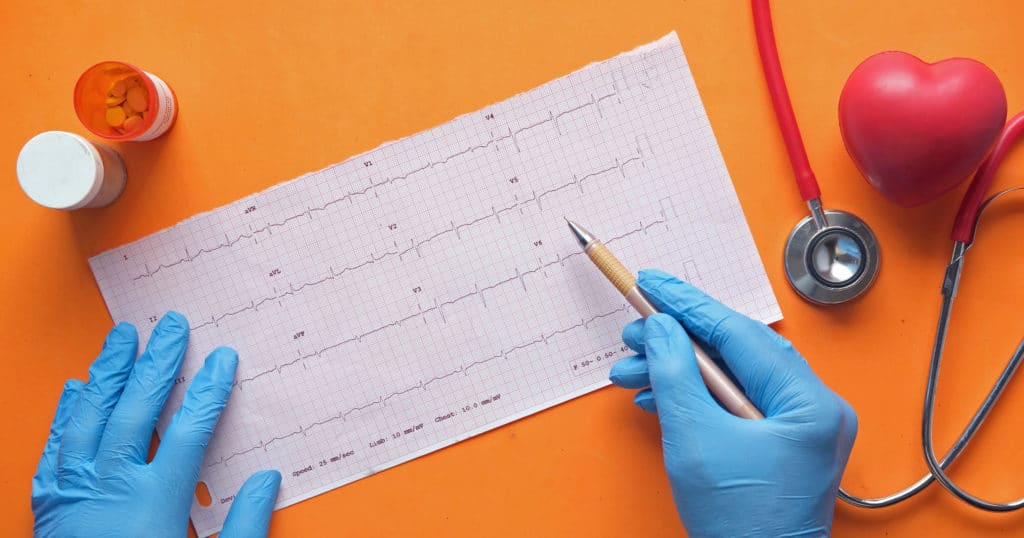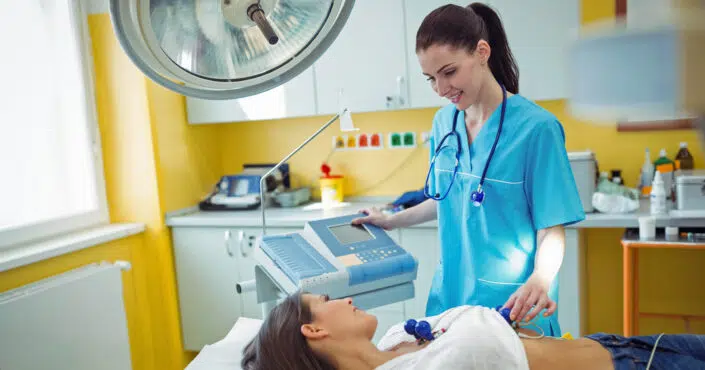In 2021, the Centers for Disease Control listed heart disease as the number one cause of death in men and women in the United States, marking the 100th year this has been the case, even during the pandemic. Although advances in prevention, detection, treatment and care have resulted in a decline in cardiovascular deaths in relation to age-adjusted deaths, heart disease remains the leading cause of death despite the remarkable progress made over the last several decades. Because of this, patients in healthcare settings continue to require cardiac interventions and testing, hence the importance of having EKG knowledge as part of your nursing skills.
The Role of EKGs in Heart Disease Intervention
The electrocardiogram, also called an EKG or sometimes noted as an ECG, measures the heart’s electrical activity. An EKG shows changes in heart activity and may even show things like a heart attack. Healthcare professionals use EKGs in emergency situations as well as routine screenings. You may use EKGs for many concerns, including:
- Chest pain
- Shortness of breath
- Dizziness
- Increased heart rate
- Palpitations
- Fainting
- Cardiac disease
- Cardiac arrhythmias
Healthcare workers should prepare for increased exposure to EKGs by developing their interpretation skills. Fast interpretation in an emergency setting can be vital in saving a life. An EKG course is an excellent way for nurses to refresh their knowledge and boost their skills.
What Type of Nurses Use EKGs?
Who actually uses EKGs in the nursing world? The simple answer is everyone. All nurses may need to interpret an EKG during their careers, but most don’t feel they receive enough training in EKG interpretation. A prominent cardiologist in London, England, surveyed 50 nurses across the London North West University Healthcare NHS Trust’s hospital sites on their confidence level in interpreting EKGs. Only two nurses reported they were confident they knew how to correctly interpret an EKG, leading to the first hospital-led EKG training courses for UK nurses to overcome this skills gap.
Most nursing schools think that many nurses still don’t use EKGs, so they don’t teach things that won’t apply to everyone. However, as healthcare advances, this is no longer true and any type of nurse may use EKGs.
For example, telemetry nursing jobs include monitoring EKGs. Nurses wanting to enter this field can boost their careers by taking the National EKG Certification and Review Course and passing the National Telemetry Certification exam. Also, nurses seeking Advanced Cardiac Life Support training and certification must know how to read EKGs before taking the course. They must take an ACLS Pre-Course Self-Assessment to ensure they have sufficient knowledge to take the course and minimize the risk of failing.
What Is an EKG Course?
An EKG course is a class entirely dedicated to teaching nurses how to read and interpret an EKG.

These courses often consist of lectures with lengthy discussions of all components or “waveforms” of the EKG. Detailed discussions help nurses identify what each waveform means regarding various heart concerns. Courses also often include lectures regarding common heart arrhythmias. These lectures may cover skipped beats, atrial fibrillation and even asystole, known as a flatline.
Finally, students receive ample practice time to become more comfortable looking at actual EKG readings and interpreting them during the course. Hands-on practice is the most essential part of an EKG course because the more you practice with exposure to real-life situations, the easier it becomes to interpret EKGs quickly and in the moment on the job. After completing the course, you usually receive practice materials to take home and continue your studies.
In addition, the American Association of Critical-Care Nurses offers the Essentials of ECG and Dysrhythmia Monitoring course online. This course boosts nurses’ confidence and skills in identifying cardiac rhythms and helps them apply a standardized approach to interpreting actual rhythm strips.
How EKG Courses Improve Nursing Skills
Many nurses working in facilities with few or maybe even no cardiac patients often wonder why they should take an EKG course. There are many different reasons to do this, even if you don’t see it that often.
Even if you don’t see any primarily cardiac patients, your patients may likely have some underlying cardiac issues potentially contributing to an incident during their time with you. Taking an EKG course can really increase your understanding of the cardiovascular system in general and better prepare you for these rare emergencies when they do happen.
Nurses who have cardiac patients and see EKGs regularly more directly benefit from an EKG course. These courses can help refine their skills so they can better recognize subtle changes in their patients and respond to emergencies quickly and efficiently.
Specific benefits of taking an EKG course include:
1. You better understand the cardiovascular system and how the heart responds
Taking an EKG course gives you further education about the heart’s function, making the information beneficial even if your patient isn’t hooked up to an EKG. Since so many patients have heart issues, knowing how the heart can influence the entire body is vital for caring for the whole person.
2. You develop faster responses during emergencies
Whether you see EKG readouts regularly or you don’t, refining your skills and practicing interpretation can help you prepare for faster performance on the spot and with a patient. When emergencies occur, sometimes there aren’t many people around, and nurses know the first few minutes of a code are critical.
When you have a better understanding of an EKG, you can respond quickly with the appropriate measures, such as CPR and defibrillation. How you respond can influence whether a patient recovers. Faster responses during code blues, rapid responses or other emergencies can be life-saving.
3. You recognize subtle changes in patients before a code
For nurses in facilities with continuous EKG monitoring, such as the emergency department or intensive care units, identifying subtle changes in your patients and their EKGs can help prevent emergencies. For example, suppose you recognize that your patient’s heart begins to slow, increase or become irregular. You can quickly respond with interventions before a more life-threatening change occurs, like a non-life-sustaining rhythm or even cardiac arrest.
Are you ready to take an EKG course?
Cardiac disease killed over 700,000 people in 2021 alone. Every nurse should have a solid baseline understanding of the heart, its function and the ability to interpret an EKG to help improve patient outcomes. Most nursing schools don’t provide this education, but you can supplement your education by taking an EKG course. Doing this helps save lives and prevent further complications for your patients. Increasing your knowledge also boosts your nursing skills, which can help you take the next step in your nursing career.










I am an RN and had ACLS and Critical Nursing certifications in 2015 but expired. Are classes all online?
Thanks for reaching out, Diane. If you’re wondering about EKG courses, many are only offered online, however there are some in-person courses offered, such as those at Rutgers School of Nursing and Lehman College. We suggest checking with your local nursing schools and community colleges to learn whether any nearby courses are available.